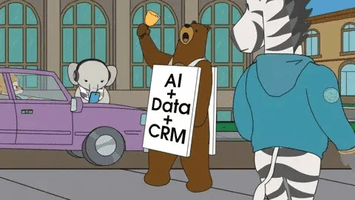AI Trends: What to Expect for Your Business in the Next 5 Years
Are you ready to discover how artificial intelligence will redefine businesses in the coming years? From advanced medical diagnostics to digital assistants automating key tasks, the future of AI promises revolutionary advancements. Don’t fall behind: learn about the trends that will change the game in your industry.
Introduction: The AI Horizon in the Near Future
Artificial Intelligence (AI) is no longer just a technological trend; it has become a catalyst for significant changes across multiple sectors. Over the next five years, its evolution promises to accelerate automation, enhance personalization, and transform the way businesses operate.
A study by Forbes Advisor revealed that 64% of companies expect increased productivity thanks to AI, underscoring its impact on operational efficiency and strategic decision-making.
💡 In this article, we will explore:
- OpenAI’s 5-Level Framework.
- Emerging trends that will shape the future of AI.
- How these trends will impact key industries.
- Predictions on business impacts and technological democratization.
OpenAI’s 5-Level Framework
AI is rapidly transforming the business landscape. To understand where we’re headed, OpenAI has introduced a 5-level framework that describes the journey from current AI to Artificial General Intelligence (AGI). Understanding this framework is essential for anticipating and preparing for the changes that will impact your business in the coming years.
Level 1: Conversational AI
This is the level we are currently at. Conversational AIs can engage in human-like dialogues, understand and generate natural language, answer questions, and perform basic tasks based on text inputs.
Examples:
- ChatGPT (OpenAI): A language model capable of natural conversations and assisting with various textual tasks.
- Gemini (Google): An AI system designed for open-ended dialogues and solving complex problems.
- Claude (Anthropic): An AI assistant adept at natural language conversations and textual tasks.
Business Impact:
- 24/7 customer support optimization.
- Automation of simple administrative processes.
📌 Example: AI tools integrated into CRMs like HubSpot reduce response times and improve customer satisfaction.
Level 2: Reasoners
"Reasoners" represent a significant leap in AI capabilities. These systems can solve complex problems at a level comparable to humans with doctoral education, without relying on external resources.
Example: GPT-4 (OpenAI): While primarily a language model, it has shown improvements in tasks requiring reasoning and analysis of complex scenarios.
Impact on Key Industries:
- Healthcare: Accurate diagnostics and drug discovery (e.g., Atomwise).
- Finance: Predictive analytics and real-time fraud detection.
Level 3: Agents
At this level, AI "Agents" can act autonomously on behalf of users for extended periods, performing tasks, making decisions, and adapting to changing circumstances without constant supervision.
Example: CrewAI: A framework for orchestrating AI agents that collaborate on complex tasks, each with specific roles and expertise.
Expected Impact:
- Increased productivity by delegating entire projects to AI.
- Improved operational decision-making.
Level 4: Innovators
"Innovators" can develop original ideas and solutions, potentially driving breakthroughs in various fields. They not only solve existing problems but also identify new challenges and create innovative approaches to address them.
Examples:
- DALL-E 2 (OpenAI): Generates unique and creative images based on text descriptions.
- AlphaGo Zero (DeepMind): Developed novel strategies in the game of Go, surpassing human knowledge and demonstrating innovation in gameplay.
Implications: Companies can accelerate product and service innovation, positioning themselves as industry leaders.
Level 5: Organizations
The most advanced level, where AI systems can perform the work of entire organizations. They would manage complex workflows, make strategic decisions, and optimize operations across multiple departments and functions.
Potential Future Applications:
- AI-driven Corporate Management: Systems that analyze market trends, manage human resources, and make high-level decisions.
- AI-powered Healthcare Systems: Could manage hospital operations, coordinate research, and analyze global health data.
Where Are We Today?
Currently, we are between Levels 2 and 3 of OpenAI’s 5-Level Framework:
- Level 2: Reasoners: Tools like GPT-4 already show advancements in complex reasoning, solving problems accurately without external resources.
- Level 3: Agents: Technologies such as Darwin AI’s digital employees represent the onset of "Agents," capable of autonomous action, optimizing tasks across multiple processes without constant supervision.
Key Takeaway: These innovations are already impacting business productivity and personalization. However, progress toward more advanced levels (4 and 5) promises to further transform organizational management and innovation in the years ahead.
What Does This Mean for Your Business?
- Preparation and Adaptation: It is essential for businesses to stay informed about these advancements to adapt and capitalize on new opportunities.
- Progressive Integration: Consider how Level 2 and Level 3 technologies can be integrated into your current operations to enhance efficiency and competitiveness.
- Continuous Innovation: Foster a culture of innovation that is open to adopting advanced AI solutions as they develop.
The path to AGI will bring transformative changes across all sectors. By understanding OpenAI’s 5-level framework, your business can strategically position itself to face challenges and seize opportunities that will arise in the next five years.
Emerging Trends in Artificial Intelligence
Impact on Productivity and Business Optimization
Companies adopting AI tools are experiencing tangible improvements:
- According to Boston Consulting Group (BCG), consultants using ChatGPT completed 12% more tasks, in 25% less time, and with 40% higher quality.
.gif?width=480&height=270&name=image%20(1).gif)
- Integrations with CRMs enable the automation of processes like inventory management and data analysis, reducing human error and speeding up decision-making.
💡 Practical Example: Solutions like Darwin AI's digital employees are at the forefront of this revolution, automating repetitive tasks and enhancing the customer experience. These tools combine precision with empathy, optimizing workflows and ensuring fast, personalized responses.
"AI is transforming the way businesses manage their operations, delivering faster and higher-quality results than ever before." — Boston Consulting Group (BCG)
Expansion in Personalization and Accessibility
Generative AI is taking personalization to unprecedented levels:
- Innovative Example: Ann Johnson, with the help of a team led by Eddie Chang, was able to communicate using brain signals interpreted by AI.
- In marketing and customer service, generative AI tools improve interactions by leveraging text, images, and voice to deliver more relevant and personalized responses.
Why it matters: Personalization is no longer a luxury but a necessity. Businesses that adopt these technologies will be better positioned to excel in competitive markets.
Advances in Multimodal and Generative Models
Multimodal models are redefining human-machine interaction:
- In 2023, OpenAI introduced multimodal capabilities in ChatGPT, enabling more comprehensive interactions with text, voice, and images.
- Google launched Search Generative Experience (SGE), transforming online search and data analysis (Stanford Research on Foundation Models).
"Multimodal models not only make business operations more efficient but also reinvent how we create and consume content." — Stanford Research
These technologies are driving innovation across industries such as healthcare, retail, and education, unlocking new possibilities for solving complex problems.
Mass Adoption and Technological Democratization
Access to AI tools in business has never been more inclusive:
- ChatGPT reached 100 million users within just two months of its launch.
- Small and medium-sized enterprises (SMEs) are leveraging these solutions to compete on equal footing with larger companies.
Impact Across Industries
AI is making a profound impact in a wide range of sectors, from healthcare to manufacturing. Here are some of the key industries where AI is making a significant difference:
Healthcare
- Faster and more accurate diagnoses: Tools like IBM’s Watson for Oncology are helping doctors analyze large volumes of data to identify effective treatments quickly.
- Advances in robot-assisted surgery: With machine learning, safer and less invasive surgical techniques are being developed.
📌 Example: According to Habehh & Gohel (2021), machine learning has already reduced medical errors in complex diagnoses by up to 30%.
Education
- Personalized learning: AI systems analyze individual student needs, tailoring content and pacing accordingly.
- Administrative automation: Enrollment processes and progress tracking are now more efficient thanks to intelligent platforms.
Retail and Customer Service
- Automated interactions: Virtual assistants are revolutionizing how customers receive support, resolving issues in real-time.
- Inventory management: AI algorithms predict demand, optimizing storage and reducing waste.
📌 Example: Darwin AI is already helping companies provide 24/7 customer support through digital employees integrated into CRMs and platforms like WhatsApp.
Manufacturing and Logistics
- Predictive maintenance: Smart sensors and deep learning identify machinery issues before they escalate into critical failures.
- Route optimization: Advanced algorithms calculate the best transportation routes, reducing costs and delivery times.
💡 Key Insight: Companies like Tesla and Amazon are leading these applications, maximizing efficiency in their supply chains.
Real Estate and Financial Services
- Lead automation: AI analyzes customer data to identify high-potential sales opportunities.
- Fraud detection: Advanced algorithms evaluate transaction patterns in real-time, spotting suspicious activities.
"AI’s ability to process millions of data points in seconds is revolutionizing how financial and business decisions are made." — Deloitte AI Institute
.gif?width=500&height=500&name=image%20(4).gif)
5. Responsible AI: Ethics and Regulation
The widespread adoption of future technologies brings significant responsibilities. Over the next five years, we will see a stronger focus on:
- Transparency and fairness: Ensuring that algorithms do not perpetuate existing biases will be key to building trust in AI solutions.
- Data protection: Regulations such as the General Data Protection Regulation (GDPR) and UNESCO guidelines are paving the way for the safe and ethical use of artificial intelligence.
📌 Example: Companies like Microsoft and Apple are already investing in advanced encryption and anonymization measures to ensure user privacy.
6. Conclusion: A Promising Future with Intelligent Allies
The future of AI is exciting and full of possibilities. From process automation to extreme personalization, artificial intelligence promises to transform how we live and work.
Darwin AI is already helping businesses of all sizes harness these technologies with intelligent solutions that combine precision, efficiency, and empathy. In this promising future, having a strategic ally will be the key to staying at the forefront of innovation.
.png)






